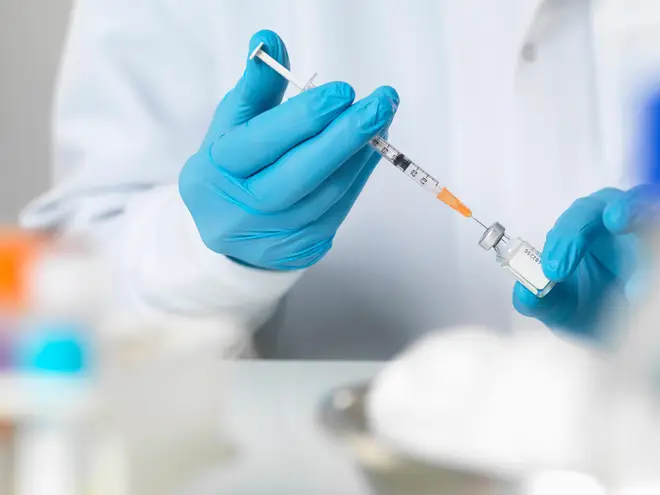
Clive Bull 1am - 4am
26 January 2024, 09:39 | Updated: 26 January 2024, 09:41

The first vaccine for bowel cancer is undergoing trials and could be available in two years.
The vaccine targets a sub-type of bowel cancer, which accounts for about 15% of all cases.
Researchers hope that the vaccine, given in two doses three weeks apart, will help the immune system fight cancer and shrink tumours.
Bowel cancer is the fourth-most common form in the UK, with over 42,000 people diagnosed every year - so a vaccine could be a huge boost to the nation's health.
The jab is being tested by the Royal Surrey NHS foundation trust on patients in the UK and Australia.
Read more: Beloved podcaster Deborah James dies aged 40 after bowel cancer battle
Read more: Terminally ill Jonnie Irwin back in hospital and 'hasn’t slept for six nights'

Basser Center Executive Director on possible cancer vaccine
Dr Tony Dhillon, consultant medical oncologist at Royal Surrey, and Professor Tim Price of the University of Adelaide, have led the development of the drug.
Dr Dhillon said: "This is the first treatment vaccine in any gastrointestinal cancer and we have high hopes that it will be very successful.
"We think that in a lot of these patients that the vaccine will completely get rid of the cancer. That's the level we're talking about, not just shrinkage.
"There are drugs which already target these proteins with big responses but people have to take them forever so we're expecting our vaccine to be as good or even better.
"It feels like we're on the cusp of something really big here with this vaccine, we're very excited."

'I'm too busy to be dead': caller tells Tom how he reacted to being diagnosed with terminal cancer
The cancer that the vaccine works on is a "hyper-mutated" variant that attracts immune cells that are unable to fight it.
The jab, developed by biotech company Imugene, activates the immune response by targeting a protein that leaves the body unable to fight back.
The vaccine will be trialled on 44 patients with stage 2 or 3 cancer, before the disease has spread.
If it is successful, the development team think the vaccine could be licensed for use within two years, the Mail reported. Further trials are set to be carried out on stage four patients and different types of cancer.
Dr Dhillon added: "We're hoping that when we follow patients over time, that it won't just shrink the tumour and make surgery easier, and cure them, the survival will improve because the immune system is activated and their B cells are.
"Our vaccine is designed to activate T-cells - the business and the killer cells -and the memory B cells so you wouldn't have to keep giving it.
"This is very exciting as it would be an 'off the shelf' vaccine, a one-size fits all vaccine."
Royal Surrey's chief executive Louise Stead said: "We are hugely proud to have been involved in the launch of this ground-breaking new vaccine.
"Helping to fight cancer is a huge part of what we do and this will really provide an opportunity for bowel cancer patients and give them real hope of beating the disease."